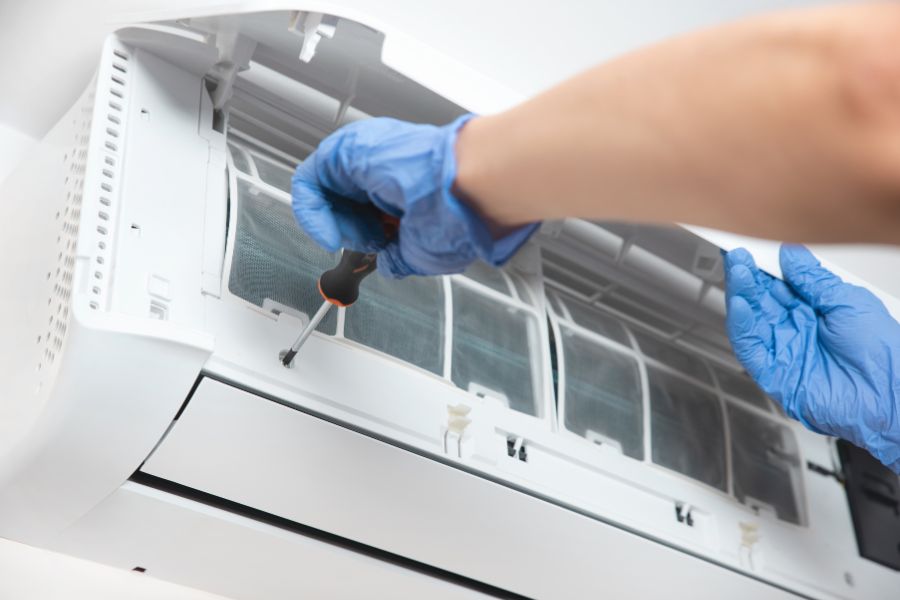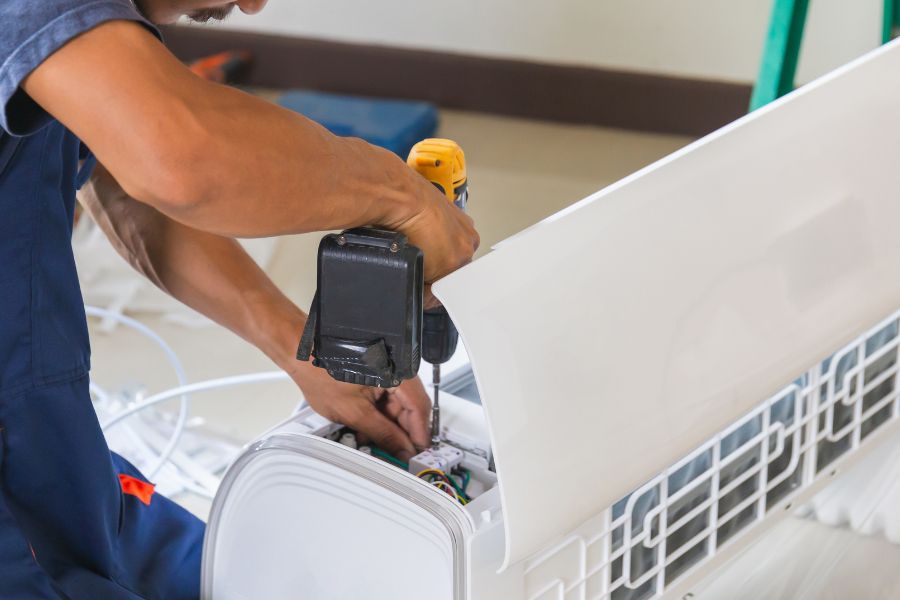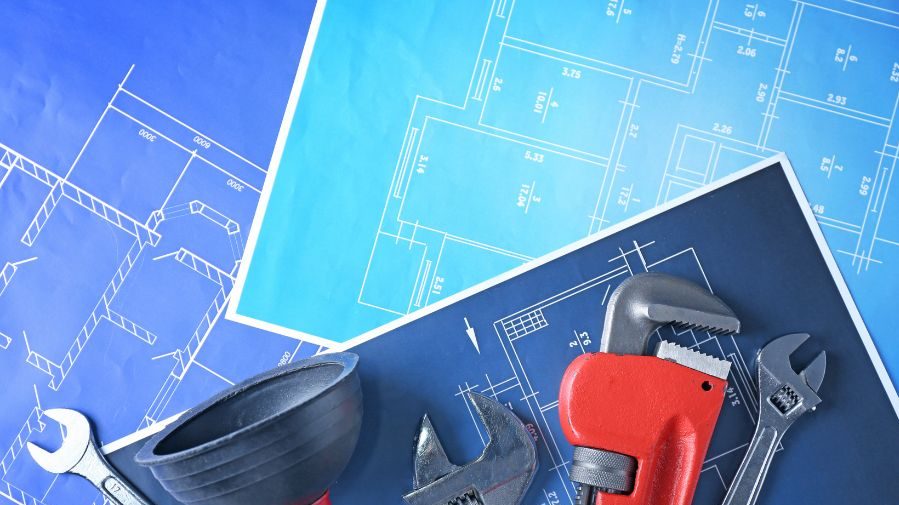Air conditioning is no longer a luxury but a necessity in modern homes, with temperatures soaring during the summer months. However, over time, even the most reliable air conditioners can start showing signs of wear and tear. This article aims to provide you with a comprehensive guide on fixing and replacing your air conditioner.
Types of Air Conditioner Problems & Solutions
Air conditioning problems can range from minor issues that you can solve yourself to major ones that require professional intervention. Here are some common problems and their potential solutions:
- The air conditioner doesn’t turn on: This could be due to issues with the thermostat or circuit breaker. Make sure your thermostat is set correctly and try resetting your circuit breaker.
- The air conditioner isn’t cooling enough: A dirty filter or an issue with the refrigerant could be responsible for this. You may need to clean or replace your filter or have a professional check your refrigerant levels.
- The air conditioner is making strange noises: This might be due to loose parts inside the unit. A professional inspection may be needed to identify the exact cause.
- The air conditioner produces bad smells: Mould or bacteria growth inside your unit could be causing this problem. A thorough cleaning would be necessary in such cases.
When Should You Consider AC Repair in Northern Virginia?
While regular maintenance can extend the life of an AC unit, there comes a point when replacement becomes inevitable. Here are some signs that it may be time for a new air conditioner:
- Your unit frequently breaks down
- The cost of repairs is more than half the price of a new unit
- Your electricity bills are consistently high despite regular maintenance
- Your AC is more than 10 years old
Choosing Air Conditioner Repair Services in Northern Virginia
When it’s time to replace your AC, consider factors like energy efficiency, size, brand reputation, and cost. An energy-efficient model can save you money in the long run, while the right size ensures optimal cooling. It’s also important to choose a reliable brand with good customer service.
The Process of AC Repairs in Northern Virginia
The process begins with diagnosing the problem. You might be able to do this yourself for simple issues, or it may require a technician’s expertise. Once the issue is identified, you can decide whether it’s best to repair or replace the unit.
If repairing is the best option, a technician will fix the problem and make sure your AC is working optimally. If replacing your unit is necessary, an HVAC professional will guide you through selecting and installing a new air conditioner.
Remember, regular maintenance can help prevent many problems and extend your air conditioner’s lifespan. So, invest time in cleaning and maintaining your AC unit regularly for efficient and effective cooling.

Air conditioning problems can be a significant inconvenience, especially during the hot summer months. Various issues can cause the air conditioner to malfunction, affecting its efficiency and functionality. This section will focus on common AC problems, from dirty filters to faulty refrigerants.
Dirty or Clogged Filters
One of the most common AC problems revolves around dirty or clogged filters. The air filter’s role is to trap dust and other airborne particles that could damage your conditioning system. However, when it’s clogged with dirt and dust, the air conditioner has to work harder than usual, leading to reduced efficiency and increased wear.
Here are steps you can take when dealing with a dirty or clogged filter:
- Regularly check and replace your filters: Most experts recommend replacing them every 90 days for optimal performance.
- Clean reusable filters: Some filters are designed for multiple uses. Clean them as per the manufacturer’s instructions.
- Use high-quality filters: Higher quality filters capture more particles and last longer than their cheaper counterparts.
Thermostat Issues
Another common problem with air conditioners is thermostat issues. The thermostat controls the temperature settings for your AC unit, but if it malfunctions, it can cause your AC not to turn on or run continuously.
To address this issue:
- Ensure that your thermostat is set correctly. Sometimes a simple adjustment solves this problem.
- Check batteries if you have a digital thermostat: A low battery could be causing irregularities.
- Consider replacing an old mechanical style thermostat with a programmable one.
Refrigerant Leaks
Your air conditioner’s refrigerant is what cools the air inside your home. If not enough refrigerant exists due to leaks or undercharging at installation, your AC unit may not perform efficiently.
To troubleshoot:
- Check frequently for any visible leaks around your unit.
- Call an HVAC professional if you suspect a leak. It’s illegal to release refrigerants into the atmosphere, so DIY repair isn’t recommended.
Drainage Problems
The condensate drain of your air conditioner removes the moisture condensed out of your home’s air. If it gets clogged, water can back up into your home, damaging your system and possibly causing health issues.
Here is what you can do:
- Regularly inspect condensate drain for blockages.
- Use a wet-dry vacuum to remove any debris from the condensate drain line.
- Call a professional if issues persist.
Remember, preventive maintenance is key in avoiding most common air conditioner problems. Establishing a regular servicing schedule with an HVAC professional can help spot small issues before they become significant problems.
When the summer heat waves come around, your air conditioner becomes indispensable. However, sometimes your AC unit might not cool your room adequately, which can be frustrating. Understanding the reasons why this happens is the first step towards resolving the issue. The following points will help you recognize and address when your air conditioner is not adequately cooling a room.
Possible Reasons for Inadequate Cooling
- Dirty Filters: A common reason for inadequate cooling is dirty or clogged filters which restrict airflow, resulting in reduced cooling efficiency. Regular cleaning or replacing of filters can resolve this issue.
- Low Refrigerant Levels: If your AC unit isn’t adequately cooling a room, it may be due to low refrigerant levels. The refrigerant absorbs heat from the air and cools it down. If there’s insufficient refrigerant, the AC will struggle to cool the air effectively.
- Faulty Thermostat: A malfunctioning thermostat could mistakenly interpret that your room has reached its desired temperature, thereby causing premature shutdowns or inefficient performance from your AC unit.
- Inadequate Size or Capacity: If you have an undersized AC for a large room, it may not have enough capacity to cool the entire space effectively.
Addressing the Issue
Once you’ve recognized that your air conditioner is not adequately cooling a room, here are some steps you can take:
- Regular Maintenance: Regular maintenance of your air conditioner is essential to keep it running efficiently. This includes cleaning or replacing filters regularly, checking for any leaks in refrigerant lines and ensuring all mechanical parts are functioning correctly.
- Check Thermostat Settings: Make sure that your thermostat is set at an appropriate temperature and in “cooling” mode.
- Professional Help: If basic troubleshooting doesn’t improve the cooling efficiency of your AC unit, it’s time to call in professional help. A licensed HVAC technician can diagnose and fix issues like refrigerant leaks or mechanical failures.
- Upgrade Your AC: If your air conditioner is old, it might not be as energy-efficient or effective as newer models. Upgrading to a newer model could solve your cooling problem and save you money in the long run.
The health of your air conditioner significantly impacts its ability to cool a room effectively. Recognizing when it’s not doing an adequate job is essential, but taking steps to address any issues is equally crucial. Regular maintenance, keeping an eye on thermostat settings, and knowing when to call for professional help or upgrade your unit are all important in ensuring that you have a well-functioning air conditioner that can keep you cool when needed.

At some point in the lifespan of your air conditioning unit, you may encounter strange noises or unusual smells when it’s operating. Normally, an air conditioning unit should function with minimal sound and no distinct odor. If you notice any peculiarities like screeching sounds, rattling noises or a musty smell, it is a clear sign that there might be an issue with your air conditioning unit that needs to be addressed.
Identifying Unusual Sounds
- Buzzing Noise: This often signifies that there are loose parts within the system, debris in either the indoor or outdoor units, or mechanical issues with the fan motors or blades.
- Rattling Noise: It could indicate that a component within the system has become loose and is being tossed around inside.
- Squealing Noise: This might be due to malfunctioning belts, motor bearing issues or blower motor problems.
- Clicking Sound: If the clicking is constant and repetitive, this could mean there’s an electrical issue.
- Hissing Noise: A persistent hissing sound could mean there’s a leak in your refrigerant line.
Identifying Unusual Smells
- Musty smells: If your AC emits a musty odor, it can often indicate mold growth within your unit or ductwork which requires immediate attention.
- Burning Smell: An electric burn smell strongly suggests an electrical problem with the wiring or motor of your air conditioner.
- Rotten egg smell: This unpleasant odor usually means there’s a dead animal somewhere in your ductwork.
- Chemical Odor: A strong chemical smell can often indicate a refrigerant leak from your AC unit which poses health risks if left unattended.
Once you have identified these abnormal sounds and odors from your air conditioning unit, the next step is to seek professional help. Although a few issues can be remedied with basic troubleshooting, most problems that cause strange noises or smells need the attention of skilled and knowledgeable HVAC professionals.
Remember, it’s essential not to ignore these signs. Prolonged abnormalities can lead to more complex issues over time, potentially resulting in expensive repairs or even replacement of your entire air conditioning system. Regular maintenance and prompt attention to unusual sounds and smells will extend the lifespan of your AC unit, ensuring it runs efficiently and keeps your home comfortable.
If you’ve noticed a sudden increase in your energy bill, your air conditioning unit might be the culprit. A faulty AC unit can consume more energy than usual. This section seeks to unveil this truth and help you understand how a faulty air conditioning system can lead to higher energy bills.
Air Condition Repair in Northern Virginia: Solving Issues Related to Poor Maintenance
Regular maintenance is crucial to ensure that an air conditioning unit operates at its peak efficiency. A poorly-maintained AC system can result in excessive energy consumption, leading to increased utility bills. Here are some maintenance-related factors that can cause your AC system to use more power:
- Dirty Filters: When filters get dirty or clogged, it forces your system to work harder, consuming more power.
- Neglected Coils: Dirty coils make it difficult for the system to transfer heat, causing the unit to run longer and consume more energy.
- Lack of Regular Servicing: Regular check-ups by a professional can catch small issues before they exacerbate into major problems that affect efficiency.
AC Companies in Northern Virginia: Addressing Your Aging Air Conditioner Needs
An old air conditioner will generally be less efficient than newer models. The Department of Energy has stated that replacing a 10-year-old window AC unit with an Energy Star-rated model could save you up to $20 per year on utility bills – and even more if you’re replacing a central AC unit.
Incorrect Size
The size of an air conditioner significantly impacts its efficiency. An undersized unit will have to work harder and run continuously, using up more electricity. On the other hand, an oversized unit may cool the room quickly but frequently turn on and off, which consumes more power than steady operation.
Thermostat Settings
Setting your thermostat too low in summer or too high in winter forces your AC system to work harder, thereby consuming more energy. It’s recommended to set temperatures at 78°F (25.6°C) in summer and 68°F (20°C) in winter.
Lack of Insulation
Lack of adequate insulation or air leaks around doors and windows can let cool air escape during the summer, forcing your air conditioning system to work harder than necessary. Ensuring proper insulation can help maintain indoor temperatures and reduce the load on your AC unit.
If your utility bills are unusually high, consider having a professional AC technician inspect your system to ensure it’s working efficiently. Regular maintenance, correct sizing, appropriate thermostat settings, and sufficient insulation are all crucial in ensuring that your air conditioning system operates at its peak efficiency. By taking measures to address these factors, you can significantly lower your energy bills.
- Evaluating the Necessity of Repair or Replacement for Your Quality Heating & Cooling HVAC System
- Comprehensive Guide to Air Conditioning Repair in Northern Virginia
- Effective Strategies for Water and Energy Conservation by Plumbers in Northern Virginia
- Finding Quality Plumbers in Northern Virginia: An Essential Guide
- Choosing the Right Plumbing Services in Northern Virginia for Your Residential Needs
